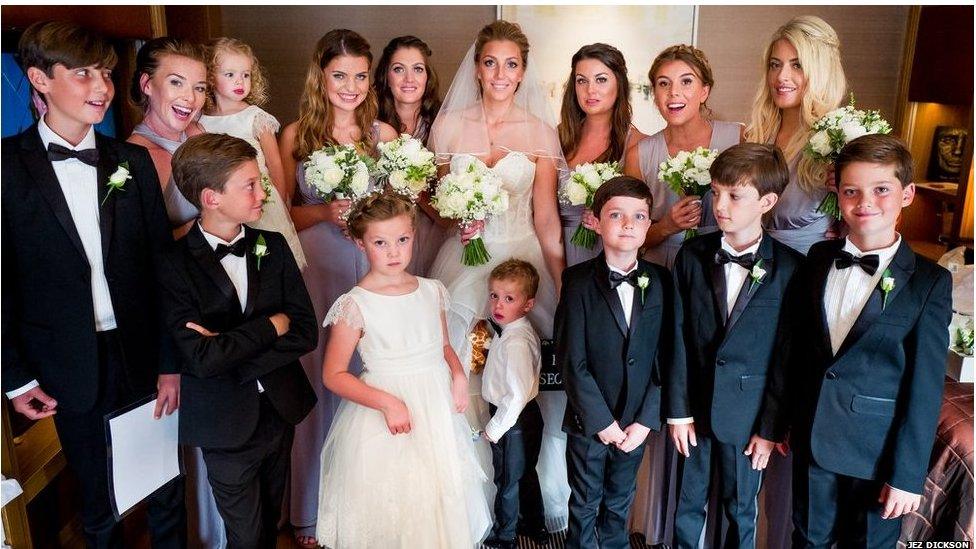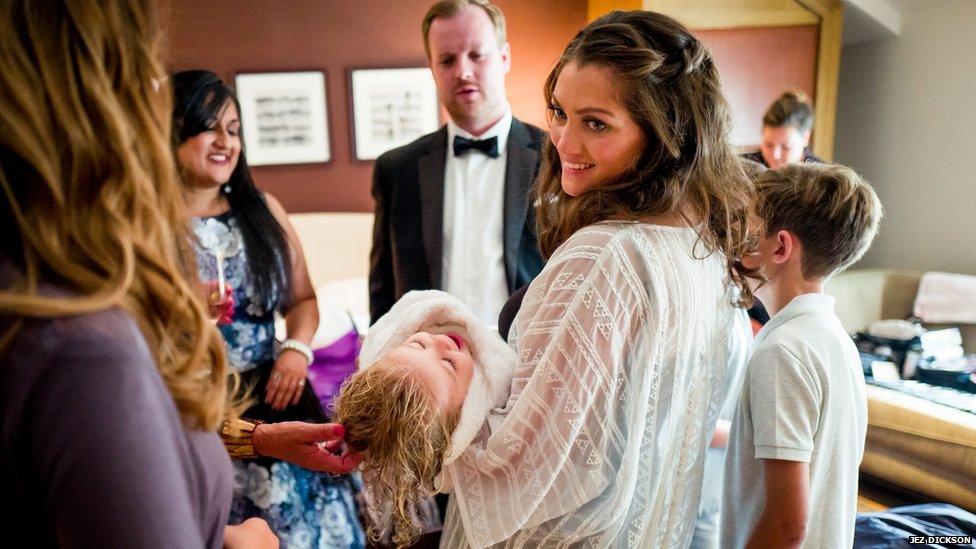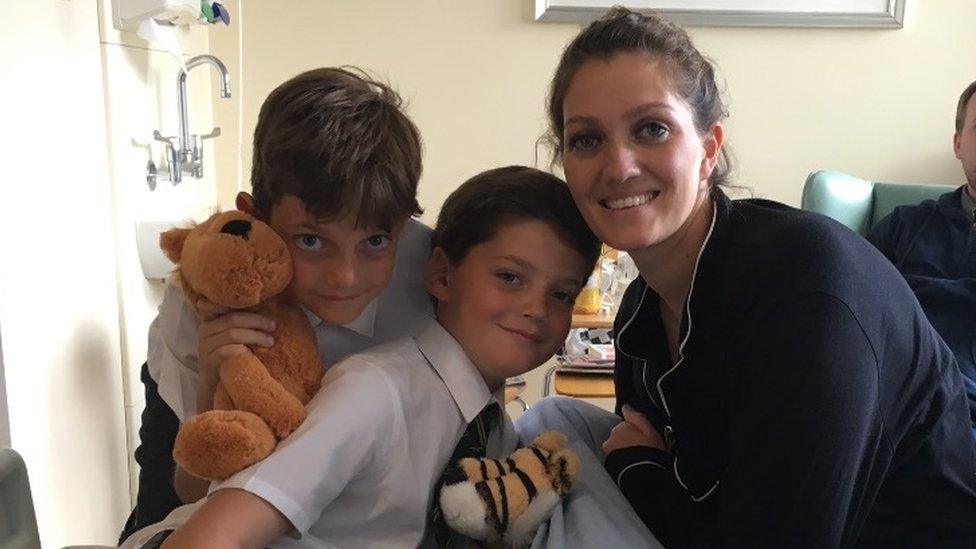'I had a cardiac arrest at my sister's wedding'
- Published
Carly (right) walking down the aisle just moments before her collapse
About 10,000 people die each year because bystanders do not know how to do CPR if they see someone in cardiac arrest, the British Heart Foundation says. One woman says she owes her life to people who acted quickly when she collapsed.
The photos capture Carly Williams smiling as she walks up the flower-lined aisle as maid of honour at her sister's wedding.
But moments later she collapsed without warning and had a cardiac arrest in front of her family, friends and two young sons.
Her heart had gone into a dangerously irregular rhythm and stopped beating.
Carly, 34, has no memory of her collapse but says she felt totally normal in the lead-up to the ceremony at a central London hotel in July.
"Apparently I said I was dizzy and I thought I might faint. I actually collapsed as soon as I sat down with my head in the other bridesmaid's lap," she tells the Victoria Derbyshire programme.
"People realised there was something wrong as I didn't stand for the bride and I started breathing in an irregular way."

Jodie, centre, pictured with Carly to her left and the rest of her bridal party.
There were calls for a first aider and ambulance. One of the guests was a childminder who realised Carly's heart had stopped and started performing CPR, helped by her two cousins who had completed a first aid course two weeks earlier.
"The hotel had a defibrillator but the staff had no idea how to use it. My cousins learned how to use it on the course. They shocked me and it worked - I had a pulse but still wasn't conscious," she says.
Meanwhile, her sister Jodie - who had been planning her £70,000 wedding for a year - had been taken out of the room along with the other guests.
"It was so surreal, like a nightmare," she says on looking back and seeing her sister undergo CPR.

Cardiac Arrest Facts

Carly, pictured holding her daughter Matilda, says she felt totally normal before the ceremony.
A cardiac arrest is when the heart malfunctions and suddenly stops beating. It causes someone to fall unconscious and stop breathing - unless treated with CPR, it is fatal
A heart attack is when blood flow to the heart is blocked, causing chest pain and heart damage
Fewer than one in 10 people survive a cardiac arrest if they are not in hospital
Every minute without CPR or defibrillation reduces someone's survival chances by 10%
Just over one in four bystanders do CPR if they see someone in cardiac arrest
Source: British Heart Foundation

Jodie believes it was lucky that she had chosen the hotel for the venue, just minutes away from St Thomas', a specialist heart hospital. She describes it as "the best decision I have ever made".
"I had been feeling very guilty worrying that this was Carly worrying about the wedding that had brought this on. My dad told me my wedding had saved her life," she says.
Another decision was also crucial. Carly had wanted to return to their hotel room to collect the corsages, but her dad said to leave them. "It was lucky I didn't go, as my heart might have stopped when I was alone in the room," she says.
Chances 'slim'
Carly was taken to hospital where she was put in an induced coma. Jodie said all she wanted to do was get out of her gown and see her - so they called off the wedding, sending the 115 guests home.
"I expected it to be the best day of my life but it was the worst. I felt like I was about to fall off the edge of the world."
Carly emerged from the coma within 24 hours. A few days later she asked if the wedding had gone ahead and felt "really bad" when Jodie explained what had happened.

Carly has been fitted with a defibrillator called an S-ICD in case her heart fails again.
"We were so excited about the wedding - but she didn't mind at all. The chances of this happening in a room with three first aid-trained people and a defibrillator are so slim that actually I was lucky that it did," she says.
Carly has had a device fitted called an S-ICD, a defibrillator that she describes as "insurance" in case it happens again. "My heart is now doing its normal thing - but they don't know why it happened," she says.
The sisters are campaigning with the British Heart Foundation for more people to learn how to do CPR and use defibrillators as part of its Restart a Heart campaign - which will see 150,000 people learn CPR on 16 October.
And Jodie says she still wants to get married, once Carly is well enough.
"I still feel traumatised and get upset by it," she says. "My big worry on the day was the kids not walking down the aisle on their own. It's hard to believe that worried me now - health is all that matters," she says.
Watch the Victoria Derbyshire programme on weekdays between 09:00 and 11:00 on BBC Two and the BBC News channel.